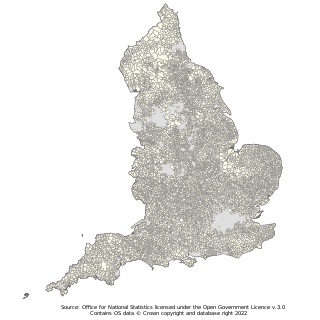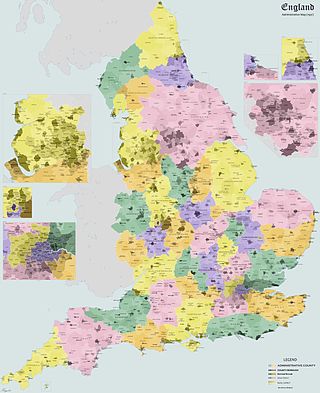
A parish council is a civil local authority found in England, which is the lowest tier of local government. They are elected corporate bodies, with variable tax raising powers, and they carry out beneficial public activities in geographical areas known as civil parishes. There are about 10,480 parish and town councils in England. Parish councils may be known by different styles, they may resolve to call themselves a town council, village council, community council, neighbourhood council, or if the parish has city status, it may call itself a city council. However their powers and duties are the same whatever name they carry.

The Department of Health and Social Care (DHSC) is a ministerial department of the Government of the United Kingdom. It is responsible for government policy on health and adult social care matters in England, along with a few elements of the same matters which are not otherwise devolved to the Scottish Government, Welsh Government or Northern Ireland Executive. It oversees the English National Health Service (NHS). The department is led by the Secretary of State for Health and Social Care with three ministers of state and three parliamentary under-secretaries of state.

Sir George Grey, 2nd Baronet, PC was a British Whig politician and a scion of the noble House of Grey. He held office under four Prime Ministers, Lord Melbourne, Lord John Russell, Lord Aberdeen, and Lord Palmerston, notably serving three times as Home Secretary for a collective 13 years.

The Local Government (Ireland) Act 1898 was an Act of the Parliament of the United Kingdom of Great Britain and Ireland that established a system of local government in Ireland similar to that already created for England, Wales and Scotland by legislation in 1888 and 1889. The Act effectively ended landlord control of local government in Ireland.

A municipal borough was a type of local government district which existed in England and Wales between 1836 and 1974, in Northern Ireland from 1840 to 1973 and in the Republic of Ireland from 1840 to 2002. Broadly similar structures existed in Scotland from 1833 to 1975 with the reform of royal burghs and creation of police burghs.

The Alkali Act 1863 was an Act of the Parliament of the United Kingdom.
A vestry was a committee for the local secular and ecclesiastical government of a parish in England, Wales and some English colonies, which originally met in the vestry or sacristy of the parish church, and consequently became known colloquially as the "vestry". At their height, the vestries were the only form of local government in many places and spent nearly one-fifth of the budget of the British government. They were stripped of their secular functions in 1894 and were abolished in 1921.
A poor law union was a geographical territory, and early local government unit, in Great Britain and Ireland.

The Local Government Act 1894 was an Act of the Parliament of the United Kingdom that reformed local government in England and Wales outside the County of London. The Act followed the reforms carried out at county level under the Local Government Act 1888. The 1894 legislation introduced elected councils at district and parish level.
Sanitary districts were established in England and Wales in 1872 and in Ireland in 1878. The districts were of two types, based on existing structures:
Town commissioners were elected local government bodies that existed in urban areas in Ireland from the 19th century until 2002. Larger towns with commissioners were converted to urban districts by the Local Government (Ireland) Act 1898, with the smaller commissions continuing to exist beyond partition in 1922. The idea was a standardisation of the improvement commissioners established in an ad-hoc manner for particular towns in Britain and Ireland in the eighteenth century. The last town commissioners in Northern Ireland were abolished in 1962. In the Republic of Ireland, the remaining commissions became town councils in 2002, and abolished in 2014.
A local board of health was a local authority in urban areas of England and Wales from 1848 to 1894. They were formed in response to cholera epidemics and were given powers to control sewers, clean the streets, regulate environmental health risks including slaughterhouses and ensure the proper supply of water to their districts. Local boards were eventually merged with the corporations of municipal boroughs in 1873, or became urban districts in 1894.

The Public Health Act 1875 is an Act of the Parliament of the United Kingdom, one of the Public Health Acts, and a significant step in the advancement of public health in England.

The Housing of the Working Classes Act 1885 was an Act of the Parliament of the United Kingdom. Sections 7 to 10 of this Act are amongst the enactments which may be cited as the Public Health Acts.
The Local Government Board for Scotland was the body charged with overseeing local government, public health, housing and poor law of Scotland from 1894 to 1919.
The History of local government districts in Middlesex outside the metropolitan area began in 1835 with the formation of poor law unions. This was followed by the creation of various forms of local government body to administer the rapidly growing towns of the area. By 1934 until its abolition in 1965, the entire county was divided into urban districts or municipal boroughs.
Municipal or local governance refers to the third tier of governance in India, at the level of the municipality or urban local body.

The Short Titles Act 1896 is an act of the Parliament of the United Kingdom. It replaces the Short Titles Act 1892.
A pre-regulation terraced house is a type of dwelling constructed before Public Health Act 1875. It is a type of British terraced house at the opposite end of the social scale from the aristocratic townhouse, built as cheap accommodation for the urban poor of the Industrial Revolution. The term usually refers to houses built in the century before the 1875 Act, which imposed a duty on local authorities to regulate housing by the use of byelaws. Subsequently, all byelaw terraced housing was required to meet minimum standards of build quality, ventilation, sanitation and population density. Almost all pre-regulation terraced housing has been demolished through successive waves of slum clearance.







